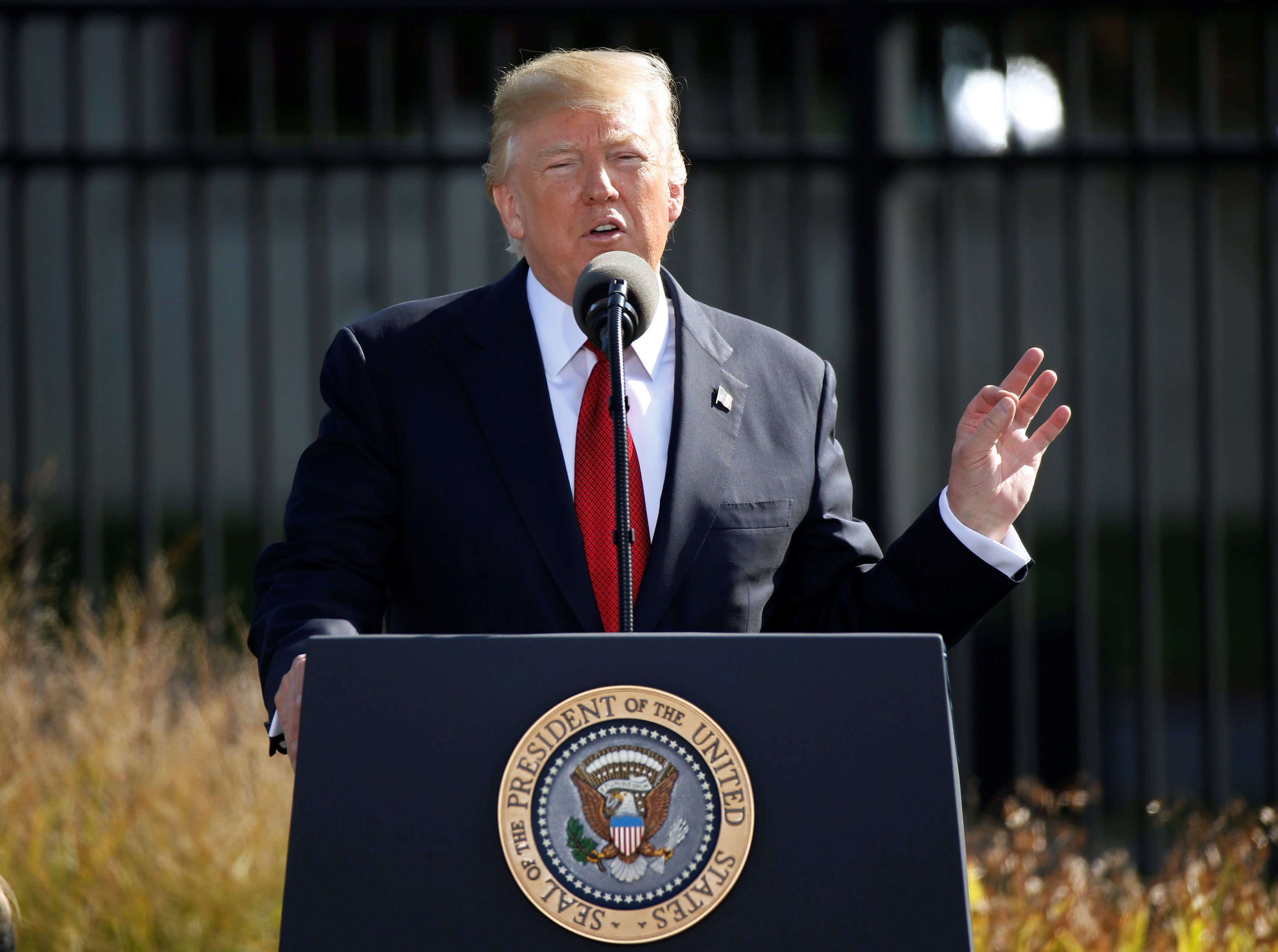 U.S. President Donald Trump speaks during ceremonies in honor of the victims of the 9/11 attacks on the 16th anniversary of the attack at the Pentagon in Arlington, Virginia, U.S., September 11, 2017. REUTERS/Joshua Roberts
U.S. President Donald Trump speaks during ceremonies in honor of the victims of the 9/11 attacks on the 16th anniversary of the attack at the Pentagon in Arlington, Virginia, U.S., September 11, 2017. REUTERS/Joshua Roberts The question of Iran’s ambitions and actions is back on the table. On the ground, Iran seems to be gaining influence in Syria. In New York, the United Nations General Assembly is about to convene to discuss matters of importance that surely will include the proliferation of nuclear weapons — North Korea at the front, and Iran as the next potential crisis.
In Washington, D.C., President Donald Trump reportedly is undecided on whether to recertify the Iran deal when the time comes to do it in October. He also reportedly is considering options for a more aggressive American policy on Iran, with the aim of containing its advances in Iraq and Syria. In Jerusalem — or rather, Buenos Aires, Argentina, where Israeli Prime Minister Benjamin Netanyahu is visiting — a renewed call for recognizing Iran’s role in spreading terrorism, including terror attacks on Israelis and Jews in Argentina, is heard.
Often mixed, there are several issues at stake. Iran’s compliance with the nuclear deal is one: The International Atomic Energy Agency (IAEA) still believes that Iran is in compliance with the agreement it signed. The Trump administration has its doubts, but has not provided any evidence of noncompliance. To argue that Iran ought to be censored or punished, the administration will have to present proof. Lacking such proof, it still can argue that Iran isn’t complying with the deal but will hardly find international partners as it seeks to turn such a declaration into action.
Truth is, Iran’s compliance with the deal is hardly the most important issue at stake. The deal was flawed, and hence compliance with it doesn’t significantly advance the cause of halting Iran’s violent and hegemonic ambitions in the Middle East. So the real dilemma for the Trump administration is not whether to claim that Iran is holding to the deal; it is whether to counter Iran even though it is holding to a problematic deal. Putting it more bluntly: It is up to the U.S. and partner nations to decide whether to alter the deal.
There have been calls on Trump to cancel or suspend the Iran deal. Indeed, if Trump does that, it could be a proper opening act for a better policy on Iran. But only an opening act — that is, an act that must be followed by a sustained, well-crafted, campaign aiming to achieve two objectives: to curb Iran’s nuclear weapons aspirations and to make it abandon its policy of expansion and aggression against other countries in the region.
Again, there are several questions involved in crafting such policies. The first is one of trust. Can the Trump administration, incompetent as it seems today, create and implement a “sustained, well-crafted, campaign” against anyone (but the media)? Then come the questions of essence: What should be the policies? What will be the price of implementing them? What are the chances for long-term success?
The trickiest problem with any plan aimed at curbing Iran’s nuclear program and aggressive foreign policy is the problem of having to square these two objectives. If the U.S. and partner nations keep the Iran deal and ensure it is implemented, they might achieve the first objective (no nuclear weapons for now) but fail on the second objective (keep Iran’s aggressiveness in check). If the U.S. and partner nations scrap the Iran deal and increase pressure on the country and its forces and proxy allies, they could achieve the second objective only to find out that Iran rushed back to expedite its nuclear program.
And of course, there are ways to achieve both objectives: The U.S. is strong enough to prevent Iran from developing nuclear weapons and from spreading its wings of expansionism. But the level of necessary American commitment to achieve these goals could be very high, much higher than the commitment advertised by the “America First” president when he was campaigning for office and much higher than the commitment Americans seem willing to accept after the Middle East wars of the last decades.
And we did not yet mention the Russians, who have forces nearby. And we did not yet mention Hezbollah and its terrorist wing that can potentially strike American forces or civilians. And we did not yet mention Trump’s bid to end the Gulf crisis and its complications. Is Trump able to carve a realistic path forward that takes into account all these factors? Some of his top aides have doubts. Some of Israel’s top policy makers have doubts. The Iranians have no doubts: They do not think he is able to do it.























 More news and opinions than at a Shabbat dinner, right in your inbox.
More news and opinions than at a Shabbat dinner, right in your inbox.